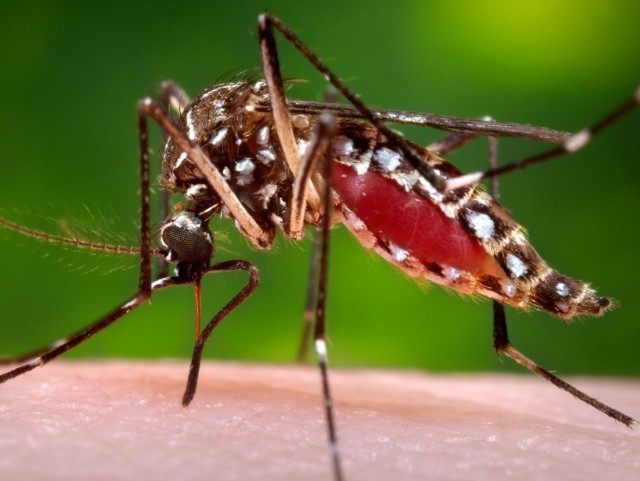SAN SALVADOR, El Salvador (AP) — Health officials say they’re trying to determine if an unusual jump in cases of a rare nerve condition sometimes severe enough to cause paralysis is related to the spread of the mosquito-borne Zika virus in at least two Latin American countries.
Fears the illness might be causing thousands of birth defects already has led authorities in Brazil, Colombia and El Salvador to take the drastic step of warning women against becoming pregnant. The U.S. Centers for Disease Control and Prevention on Friday expanded its warning for pregnant women thinking of visiting 22 destinations, most in Latin America and the Caribbean.
But concern also has been rising about a potential link to Guillain-Barre syndrome, a nerve disorder than can affect anyone. It causes muscle weakness, tingling in the arms and legs and sometimes temporary paralysis. Most people recover fully, but severe cases that affect muscles used to breathe can be life-threatening.
It’s thought to occur when someone’s immune system overreacts and attacks its own nervous system cells, often after various types of infections.
Researchers have been suspicious of the virus since French Polynesia noted a jump in cases of Guillain-Barre and microcephaly, in which a child is born with a small head, that accompanied a wave of Zika cases, though the populations were far smaller than in the recent outbreaks
The World Health Organization said Salvadoran authorities reported 46 cases of Guillain-Barre in just five weeks, from Dec. 1 to Jan. 6. The full-year average for the country is 169 cases. It said that of 22 patients on which there was information, at least 12 patients had experienced a rash-fever illness in the 15 days before developing Guillain-Barre.
Brazilian officials too have said they’re investigating a link between Guillain-Barre and Zika.
Dr. Antonio Bandeira, an infectologist with the Couto Maia Hospital in the northeastern city of Salvador, said that during last year’s rainy season, when a Zika outbreak was at its peak, he had an unusual spate of patients with Guillain-Barre.
“Zika was really bad here from February to July and then all but disappeared in August. In May, June and July, we had 24 patients come in with Guillain-Barre, and none since August,” he said, adding that in previous years he generally only saw two or three patients with the condition per year.
Nationwide, Guillain-Barre had been so rare that the Health Ministry doesn’t track the exact number of cases. Still, officials here acknowledge the rise.
“For sure, throughout the northeast we’ve quite a significant spike in cases of Guillain-Barre,” said Pedro Fernando Vasconcelos, director of the Instituto Evandro Chagas health research institute, in the Amazonian city of Belem. “And that rise is closely associated to the rise in cases of Zika virus.”
Local transmission of the virus was first formally confirmed in the Americas only nine months ago in Brazil, where officials became alarmed by a sudden rise in cases of microcephaly.
Since the start of October, the country has recorded 3,893 cases of microcephaly, compared with 150 cases for all of 2014.
Brazilian officials say they’re convinced of a link. International health bodies have said that’s not yet scientifically established, but they are on the alert.
The CDC said Friday it had acted “out of an abundance of caution” in issuing its call for pregnant women “to consider postponing travel to any area where Zika virus transmission was ongoing.”
Experts said microcephaly may not have been seen in other Zika outbreaks because until now, they’ve occurred in much smaller populations. Brazil, a nation of about 205 million, estimates that 440,000 to 1.3 million people there have been infected, though the numbers are difficult to pin down because there are no commercial tests and most people show no symptoms.
“We’re just seeing the sheer size, the magnitude brings those rare cases above the radar whereas in the past the outbreaks didn’t involve nearly as many people,” said Scott Weaver, director of the Institute for Human Infections and Immunity at the University of Texas Medical Branch in Galveston.
Guillain-Barre is very rare, too, and investigators will have the same question.
El Salvador’s government this week suggested that women avoid getting pregnant for the next two years, and some say they’re taking that advice.
“We were very lucky. My son was born before this,” said 19-year-old Fatima Mejia, who was visiting a clinic in Santa Tecla, just outside the Salvadoran capital, for a checkup on her 17-day-old infant.
“I’m not going to get pregnant until this passes. I’m not going to risk a child,” she said.
Another woman in for a checkup at the clinic, 22-year-old Sandra Barrios, also said she might avoid having more children.
“If this continues I’m going to speak with my husband about an operation on myself. I already have three children and I don’t want problems.”
In Colombia, Deputy Health Minister Fernando Ruiz told The Associated Press the country has recorded 13,531 suspected cases of Zika and said the number could rise to half a million this year.
He said at least 560 cases involve pregnant women, though there have been no detected cases of microcephaly. The Health Ministry recently urged all women in the country to avoid getting pregnant while the virus is spreading, saying that could extend until July.
Ruiz said there have been 12 cases of people with Guillain-Barre who had earlier had symptoms similar to those of Zika.
___
Jenny Barchfield reported from Rio de Janeiro. Associated Press writers Lauran Neergaard in Washington and Cesar Garcia in Bogota, Colombia, contributed to this report.

COMMENTS
Please let us know if you're having issues with commenting.